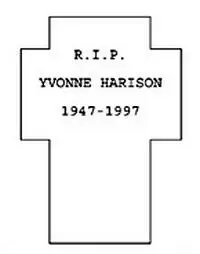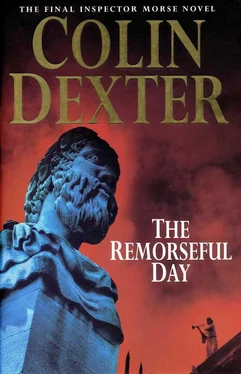
Perhaps, when the ground is sufficiently settled, the murdered woman will have some worthier monument. But for the present the grave shows little if any sign of tender loving care, and flowers no longer adorn this semi-neglected spot.
Yvonne Harrison, a fully qualified nurse, had resumed work in Oxford after her two children had left home, and on the evening of her murder had returned to an empty house, her husband Frank, as normally during the week, spending his time in his London apartment. “The Windhovers” had been broken into a few years earlier, when TV sets, video-equipment, radios, a computer, and sundry electrical items had been stolen. As a result, the Harrisons had installed a fairly sophisticated burglar alarm, with “panic-buttons” in the main bedroom and beside the main entrance door: had enlisted in the local Neighbourhood Watch group; and had acquired a Rottweiler puppy, christened Rodney, who had subsequently displayed a healthier taste for Walkers Crisps than for any unwelcome visitors, and who had sadly been run over a few months previously.
With the smashed rear window, the burglary theory was at first the favourite, although there was no apparent theft of several readily displayed items of silverware and non-too-subtly concealed pieces of jewellery. What was far more obvious to those who entered the house later that night was a body the body of Yvonne Harrison, lying on the bed in the main bedroom: naked, handcuffed, and gagged. And dead.
What immediately caught public interest was the fact that the man who discovered the body was none other than the murdered woman’s husband.
A somewhat delayed post-mortem established that Yvonne Harrison had probably been murdered by some sort of “tubular metal rod” two or three hours before her body was discovered at 11:20 p.m.. and fairly certainly not after 9:30 p.m. Independent evidence corroborated the pathologist’s findings. A local builder. Mr. John Barron, had rung Mrs. Harrison at 9 p.m. on the dot. as instructed. But he had heard only the “engaged” signal. At about 9:30 p.m. he had rung again; but although he had persisted there had been no reply. The phone was quite certainly ringing at the other end. Hither the Ansaphone had not been activated... or else the lady of the house was not alive to take the call.
Another call however had been made more successfully that evening. An extraordinarily puzzling call. At just after 9 p.m. Yvonne’s husband picked up his phone in Pavilion Road. London, to hear a man’s voice informing him that his wife was in trouble and that he ought to get out there immediately. Normally he would have driven home post-haste in his BMW. But with the car in for repairs, he took a taxi to Paddington where he caught the 9:48 train to Oxford, arriving at 10:50, where he took another taxi for the ten-mile journey out to Lower Swinstead.
Late-night traffic was thin, and when Mr Patrick Flynn braked his Radio Taxi outside “The Windhovers” at 11:20 p.m. he saw a village mansion ablaze with lights turned on in almost every room, and the burglar-alarm box emitting sharp blue flashes and a continuous ringing. The front door stood open... and the rest is history.
Or it was history until a fortnight ago. when two anonymous phone calls were received at Thames Valley Police HQ. where it is the view of Chief Superintendent Strange that promising new lines of enquiry may soon be opened.
It is surely universally to be hoped that the identity of Yvonne Harrison’s murderer will finally be revealed; and that on some more permanent memorial in St. Mary’s churchyard the name of the murdered woman will be spelt correctly.
Ponderanda sunt testimonia, non numeranda.
(All testimonies aggregate Not by their number, but their weight.)
(Latin proverb)
Most of the Thames Valley Police personnel were ever wont to pounce quickly upon any newspaper clipping concerning their competence, or alleged lack of competence. And that morning Lewis had been almost immediately apprised of the article in The Times — which he’d read and assimilated swiftly; far more swiftly (he suspected) than Morse would read it when he took it along at 8:30 A.M. The Chief was a notoriously slow reader, except of crossword clues.
Lewis remembered the case well enough; certainly remembered the frustration and disappointment that many of his CID colleagues had felt when lead after lead had appeared to peter out. Yes, he’d often experienced frustration himself, but seldom any prolonged disappointment; for which he was grateful — profoundly grateful — to Morse.
Most usually (Lewis knew it well) a murder investigation revolved around corroborated suspicion. A clue was pursued; a suspect targeted; an alibi checked; a motive weighed in the balances; a response to questioning interpreted as surly, cocky, devious, frightened... It was all cumulative — that was the word! — a series of pieces in the jigsaw that seemed to form a coherent pattern sufficiently convincing for a formal charge to be brought; for a dossier to be sent to the DPP; for a period of remand, further questioning, sometimes further evidence, with nothing cropping up in the interim to vitiate the central police hypothesis: that in all probability the arrested suspect was guilty as hell.
That was the usual pattern.
Not with Morse though.
For some reason Morse often shunned the standard heap-of-evidence approach. In fact Lewis had seldom if ever observed him, through distaste or idleness perhaps, riffle through any heap of dutifully transcribed statements, claiming (as Morse did) that since he could seldom remember what he’d been doing himself the previous evening, he found it difficult to give much credence to people who claimed to recall anything from a week last Wednesday — unless, of course, it was watching Coronation Street or listening to The Archers , or some similar regularly timetabled ritual.
No, Morse seldom worked that way.
The opposite, more often than not.
With most prime suspects, if female, youngish, and even moderately attractive, Morse normally managed to fall in love, sometimes only for a brief term, yet sometimes throughout Michaelmas and Hilary and Trinity. Toward some other prime suspects, if men, Morse occasionally appeared surprisingly sympathetic, especially if he suspected that the quality of their lives had hardly been enhanced by getting hitched to some potential tart who had temporarily managed to camouflage her basic bitchiness...
Lewis had a quick look at the Mirror , drained his coffee, and looked at his watch: 8:25 A.M. Time he got moving.
As he walked out of the canteen, he (literally) bumped into the stout figure of Sergeant Dixon — “Dixon-delighting-in-doughnuts” as Homer would have dubbed him.
“You see the thing on the Lower Swinstead thing?” (Variety was not a feature of Dixon’s vocabulary.)
Lewis nodded, and Dixon continued:
“I was with him on that for a while. Poor ol’ Strange. He thought he knew who done it, but he couldn’t prove it, could he? Poor ol’ Strange. Like I say, I was with him on that thing.”
Lewis nodded again, then climbed the stairs, wondering how that Monday morning would turn out — knowing how Morse hated holidays; how little he normally enjoyed the company of others; how very much he enjoyed a very regular allotment of alcohol; how he avoided almost all forms of physical exercise. And knowing such things, Lewis realized that in all probability he would fairly soon be driving Morse out to the Muzak-free pub at Thrupp where a couple of pints of real ale would leave the Chief marginally mellower and where a couple of orange juices would leave the chauffeur (him!) unexcitedly unintoxicated.
Читать дальше













